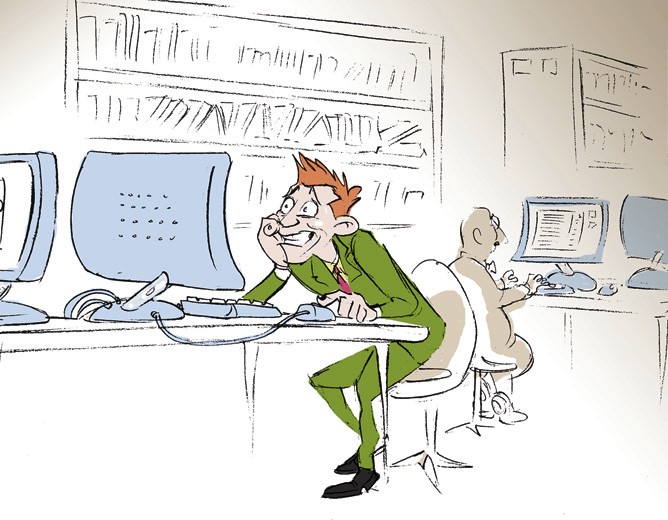An online presence is important. This same statement may not have been true ten years ago, but today the internet is so prevalent it seems that professionals ignore its power at their own peril. While it may seem unnecessary for lawyers to be active online (through Twitter, blog posts etc.) this is quickly changing. After all, law is a competitive industry with firms fighting tooth and nail for every billable hour they can get. If a lawyer can increase their client base through online networking they would be a fool not to do so, some say.
However, participating in the online community does come with drawbacks. The informality of the internet encourages off-the-cuff remarks to fast-moving events. This type-before-you-think ethos is of particular harm to lawyers who not only have to worry about their professional reputation but also must be sure to be on the right side of the profession’s code of ethics. An off-colour joke made on Twitter can be devastating to anyone’s reputation, but as lawyers are held to an exceptionally high standard of conduct this type of behavior is especially risky.
I particularly wonder about this for lawyers in the public sphere. While private lawyers may rely on their reputation to secure clients, public lawyers are in a slightly different position as they receive work purely through their position as a government employee. Marketing oneself to the public won’t do much to increase the client roster of a Crown prosecutor, as they don’t have “clients” in the traditional sense of the word. So when public lawyers see little or no marketing benefit from an online presence, the drawbacks of this type of networking come to the fore. All lawyers are held to a high standard, but this is particularly true for public lawyers. They are seen as extensions of the government, and in some cases of the justice system itself. Appearing funny and relatable online may be a benefit for a private lawyer, but the public wants its criminal prosecutors to be serious above all else. Being too accessible online can be a detriment to a prosecutor who needs to appear unbiased at all times.
In addition to the lack of professionalism that may come from an active online presence, there are also potential safety concerns. This was made very clear by one law professor (who I will not name) who requested that no one record or film his class. This request was not due to the fact that he didn’t like his voice on tape (although he admitted this to be true), but rather because as a BC Crown prosecutor he has had serious threats made against his life. Keeping all current pictures of himself off the web is something that he does to ensure his safety from such threatening individuals. While this is of course an extreme example, it illustrates just how high the stakes can be for some lawyers.
The internet is a powerful tool. And as such, it must be used carefully. For some, it is an easy and cheap way to engage in online networking and marketing, which is essential to their success as a lawyer. For others, it presents more problems than benefits. It is because of this that everyone must think clearly before diving headfirst into the creation of a professional, online persona.


I personally have concerns about my online persona. I understand that I have to be careful what I post online – but what about the pictures and posts that are already out there? What about the things others post about me, that are not under my control? It might be better/easier/in the best interest for some to delete their online profiles rather than attempt to modify them as a #L21C.
This post reminded me of an article by Justice Sopinka “Must a Judge be a Monk” wherein he discussed the ethical constraints and expectations put on judges. As I think about my future career, I ask myself the same: am I expected to be a saint of some sort? Do my clients, peers and public expect perfection from me? Are they naive enough to think that I am opinion-less? Or do they just not want to hear about it? I find it ironic that our industry places such a huge emphasis on character, and in many ways the system relies on the integrity of its actors…. and yet we must hold back on exposing certain parts of ourselves to the point that a vast part of our character remains concealed from the professional arena– it’s almost like a double life.
Great post Sarah!
I totally agree with some of the drawbacks you mentioned in regards to our participation in the online community. It seems that based on all the information we’ve been provided with, the legal profession is going to look a lot different for our generation than it has in generations past. One such change could be a reliance on social media and other online networking devices to maintain relevance in the industry. However, I agree that the improper use of these avenues could have potentially devastating effects.
In his chapter “The Path to Commoditization” Richard Susskind suggests that chargeable online legal services provide a promising commercial opportunity for those in the legal profession. While I agree that an increased presence in the online community could provide for economic growth, I’m interested to see how programs like these could be effectively regulated. Particularly in regards to the areas you mentioned like our code of ethics and standards of conduct.
Sarah, thank you for this thoughtful and well-written post. You seem to have hit on something that a lot of people have thoughts about, judging by the comments.
There’s a cost-benefit balance in online participation, no question. On the benefit side of the equation I think another aspect that’s important for lawyers to take into account, beyond pure marketing in the sense of attracting paying clients, is establishing a reputation for expertise and taking your place in a community or network of peers.
Most of us use Twitter and Facebook for fun, and there’s a high value placed on being relatable, or funny, or even outrageous. When you shift lenses and look at them as professional tools, what’s really exciting is the opportunity to share your thoughts and knowledge on legal issues. Funny and relatable might still be attractive qualities in this context, but having knowledge, insight and good judgment are really important. And sharing your knowledge, insight and judgment often prompts others to do the same reciprocally, which can be a great benefit to you if you find yourself in need of someone to consult or a pointer in the right direction – think of those networks that Brian Lamb talked about last week and how they helped him in professional situations. In my opinion, a reputation as an expert and good collaborator – which can be enhanced using social media – is just as valuable for a public service lawyer (or an academic lawyer) as it is for a private lawyer, even if it’s not “marketing” in the most traditional sense.
Another benefit is the insight that social media can give you into the thinking and concerns of others – when those others are important to your professional life. In The End of Lawyers, Richard Susskind talks about lawyers telling him they can’t see the point of using Twitter because it’s a bit trivial and silly. He points out that general counsel and other senior management people are using it more and more, and if you have a way to access what your clients are thinking about in real time, why wouldn’t you want that? Same goes, I think, for your Minister or Deputy Minister 🙂
While I understand the hype and benefits of an online presence, like Sarah said, the informality of the Internet could be a huge drawback, especially for professionals.
After reading this post what immediately came to mind was the flux of political candidates withdrawing from the upcoming Federal election. These candidates had an online presence and used it improperly. Maria Manna, a Liberal candidate expressed skepticism in 2010 and 2013 about 9/11 on Facebook. Those comments came to light forcing her resignation. Stefan Jonasson, an NDP candidate was asked to step down after comments surfaced in which he compared the beliefs of one set of Orthodox Jews to the Taliban. Blair Dale, a Conservative candidate, was also removed for comments made on several social media platforms about women, abortion and racial minorities. These recent examples show how deleterious an online presence can be, if used improperly.
Lawrence Alexander, a guest speaker from our September 30th class showed us a list of the top 10 untrusted professionals – politicians and lawyers both made the cut. With this knowledge it is especially important that as we enter the legal profession we curtail the informal comments we make and try to keep our online presence as professional as possible.
The pitfalls of an online presence are most obvious when you look at someone like Justine Sacco. I think it was Brian Lamb in one of our first classes that mentioned her (story is linked here at the bottom of this post). She was a Public Relations rep for a large corporation that owns a few social media content providers. She had a small amount of followers (170ish) on Twitter (almost all friends) and posted many comments with her brand of humour. She tweets an inappropriate joke about AIDS on her way to South Africa and for 11 hours #hasJustinelandedyet trends on Twitter.
The amazing part is that after getting fired from this job and laying low for a while, she now has another job as a PR rep with Draft Kings and Fan Duel (online daily fantasy sports providers). Both companies are currently embroiled in a PR nightmare where employees were winning significant amounts of money on their own website (or the other company’s).
People’s online personas can have immediate and irreparable consequences and people in overtly public positions should be acutely aware of what they post. As Richard pointed out, sometimes its not even what you post but what other people post on your wall or tag you in.
With greater increase and reach of technology comes some interesting choices and problems.